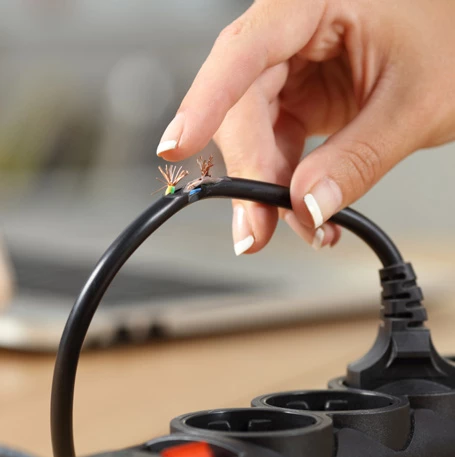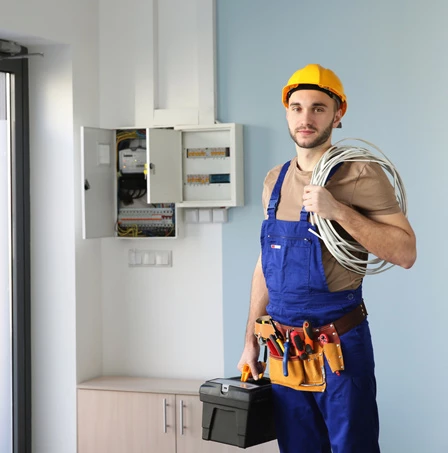Are you a landlord or a business owner? Do you own or manage rented properties? Importantly, are you looking for more information about commercial electrical installation reports? Great, you’re in the right place.
For people with no experience in this area, the world of electrical installation condition reports is a complex one. However, for legal reasons, and of course for safety reasons, these certificates are absolutely vital and we highly recommend taking the time to learn more about them.
As a landlord, it’s your responsibility to ensure your property is safe and that the electrics in your home meet electrical safety standards. As a business owner, you are also required – legally and morally – to ensure a qualified person undertakes regular electrical safety checks are your premises.
So, what is a commercial Electrical Installation Condition Report (EICR) and what does it all mean for you? We are passionate about these reports and, with over 10 years’ experience in the energy performance certificate industry, we felt obliged to produce this guide which answers the above questions and so much more.
Commercial electrical installation condition reports – often known as EICRs for short – are an evaluation of your commercial properties’ electrical installations. Or, in simpler terms, they are certificates that state whether your electrics are in good working order.
These EICR certificates are issued by qualified electricians who will carry out your EICR inspection. They will conduct inspections and tests on your electrical systems and fixed wiring. Ultimately, they will ensure that your commercial electrical installations meet electrical safety standards.
After the inspection, the qualified person will issue the landlord or business owner with your formal document. This will state clearly whether or not your electrical systems are in good working order, and will also outline if there are any issues or electrical faults that need rectifying.
Often, the electrician will also provide details and a quote for remedial works needed.
These reports are important for many reasons, but one key one is that electrics are a leading cause of accidental house fires in the UK right now, and have been for many years. Fires pose a risk to life, and they can completely destroy property too.
As a landlord and business owner, for the safety of your employees and residents, and if nothing else for your reputation locally and regionally, it’s important that you take these reports seriously – and ensure they are completed regularly.

On top of the obvious reasons – such as fire risk, employee safety and business reputation – there’s another pretty huge reason you need to ensure you have an EICR test done at your premises. You’ve probably already asked the question yourself – is an EICR a legal requirement for commercial property?
Well, we’ll give you the answer, yes. There are laws in England that require businesses and landlords to comply with electrical safety standards to ensure the safety of residents, employees, and customers.
The two key pieces of legislation you must follow are:

As an employer, you must ensure your electrical systems are safely installed and maintained. This is in order to protect your employees in the workplace. You must continually monitor this and ensure your electrical installations are periodically inspected.
As a landlord, of both commercial and domestic buildings, you are legally required to exercise all precautions to protect your clients from injury and damage caused by electric fires and shocks. By having a commercial EICR test, you are proving that you’ve taken these precautions and are compliant with electrical safety standards.
These regulations apply to all commercial properties, including:
It's complicated, we know. And of course, there is a cost associated with having these inspections done. But, just like getting your car regularly serviced, this is about ensuring your business and property is safe and fit for the future.
There are four key steps to a commercial electrical installation inspection:
Below we’ve broken down these steps in more detail.

Getting in touch with an electrical contractor: Getting in touch is obviously the first step, but it’s absolutely vital at this point that you only use a qualified electrician for this work. The individual must be certified to work on large electrical systems. When hiring a contractor for an EICR, make sure they have at least a Level 3 NVQ Diploma in either Installing Electrotechnical Systems & Equipment or Electrotechnical Services. They should also be accredited by governing bodies like the National Inspection Council for Electrical Installation Contracting.
Setting operational limitations and the extent of testing: Before the test begins, you will need to set some boundaries with the electrician you have hired. There might be certain areas in your building where testing can’t take place, for whatever reason. This should be explained to the competent person and they will note this in the report. An example of this might be installations concealed within the fabric of the building, as to test these would require reconstruction of your walls and floors.
Inspection and testing: Showtime! This stage is perhaps the most obvious of the four, and is where the electrician will inspect and test all your electrical systems. They will identify any signs of damage and deterioration, flag up any electrical systems that don’t comply with electrical safety standards, pick out any equipment that may need repairing or replacing and highlight electrics that are at risk of having an electrical fault and causing issues.
Report and remedial work: Once the inspection has taken place, you will be presented with a report signed off by the electrician and also their supervisor. This report will include any recommendations for remedial work.
The cost of a commercial EICR can depend on the size of the building and how long the inspection takes. Full inspections can take around five hours to complete and, for context, a two-bedroom flat would cost between £120-150. Much larger buildings will obviously incur bigger costs. As another guideline, assessments for commercial properties normally cost between £15-20 per circuit tested.
Don’t forget, you may also have to pay for repairs, replacement installations and remedial work once the inspection has taken place.
Regulations say that you should have a new EICR certificate issued every five years. If you don’t comply with this, you will be in breach of UK law and liable for any damage or injuries caused by an electrical fire or shock. What an EICR test offers you is the ability to prove that you have taken all reasonable steps to ensure the safety of employees and tenants.
There are some instances where you may need a more regular inspection programme:

Here at energyperformancecertificates.co.uk we proudly offer low-cost, high-quality commercial EICR assessments from our highly qualified and professional inspectors.
Here’s why we think you should choose us:
We have an excellent Trustpilot rating for a reason – we are passionate about our work and always strive to provide the best possible service. We are one of the leading providers of energy performance certificates and electrical installation condition reports in the country. We also offer competitive pricing and stand ready to help you with all your commercial EICR needs. Get in touch today.
You can get an instant quote by clicking here, or by giving us a call on 0203 397 8220 for more information. Alternatively, you can email us at hello@energyperformancecertificates.co.uk.